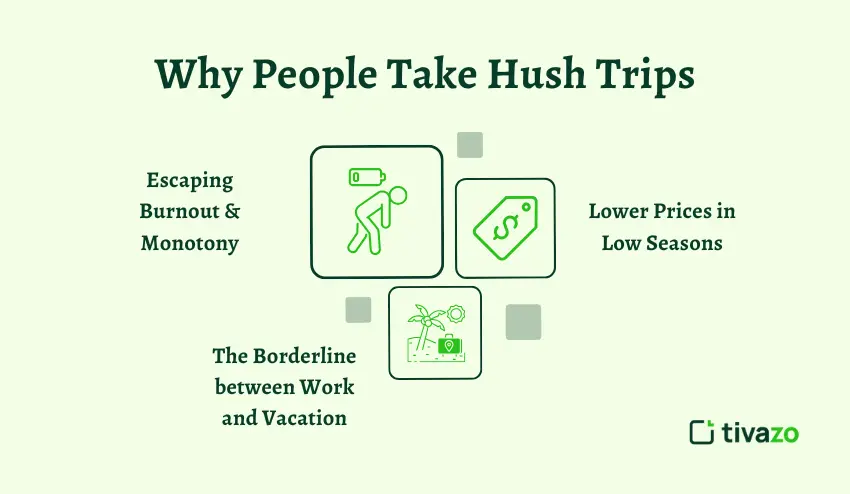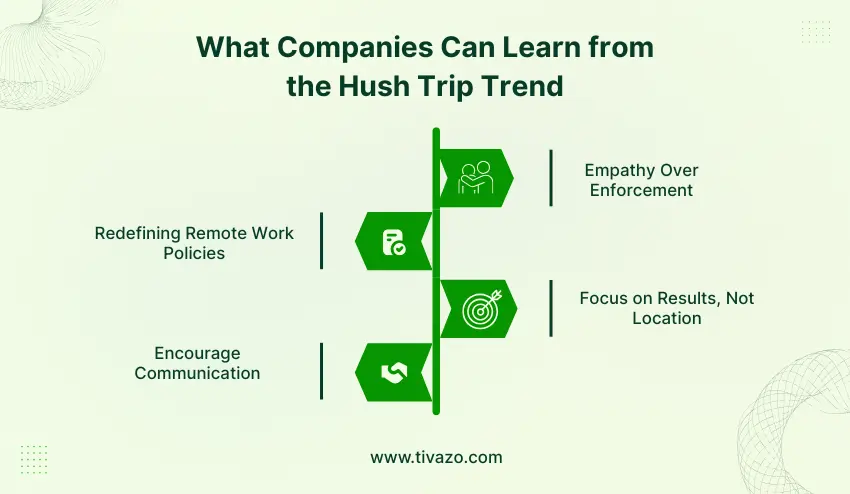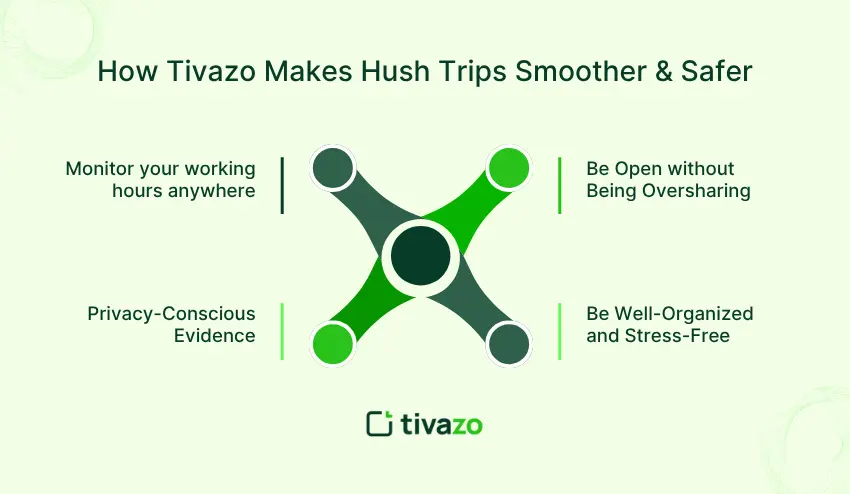Imagine the scenario, you are sitting at a beach cafe, the waves are filling your ears instead of the city noise, and you are quietly glancing through your emails before your next appointment. You are not on vacation, you are still working, you are not working at home. And your boss has no idea.
That is what a hush trip is all about: going to some new location and working remotely without officially notifying your employer. It is a silent combination of work and wanderlust, which is based on a need to get free and change the scenery. Hush trips provide professionals with the feeling of escape without losing productivity after years of remote work, which offers great variety.
However, this increasing tendency is not without the questions. Is working in the foreign country without consent ethical? What will become of you in case something goes wrong in your absence? And how do you organize a hush trip that is rewarding and responsible? This guide unravels the mystery of what hush trips are, why they have become so popular, their advantages and disadvantages and how to make yours a success, with tools such as Tivazo keeping you productive no matter where you are.
What Is a Hush Trip?
A hush trip refers to a working trip that you make without giving notice to your employer. It is done in silence unlike a normal vacation or even a pre-approved workation, and may be in a different city or even country. The idea is straightforward: to be productive and at the same time have fun in a new location, whether to be inspired, have a mental freshness, or even the excitement of working in an unlikely place.
The hush trip is derived out of the concept of keeping the travel a secret. Individuals record their regular working hours and fulfill their working obligations, yet their physical presence is not known. It is in contrast to a digital nomad lifestyle, which typically implies long-term location independence, or a workation, a work-approved mix of work and vacation.
As an example, Alex, a New York software developer, spent a week in Lisbon. He was present at meetings, he did his work and submitted reports on time, but no one at his office knew that he was not in the city. Such a minor shift in place enabled him to refresh without interfering with his work.
Hush trips can be described as a wider trend of remote work, which demonstrates how contemporary professionals are reshaping the distinction between work and personal life. They emphasize the need to have flexibility and autonomy, and also put doubts on trust, responsibility, and productivity.
Why People Take Hush Trips
Hush trips are made by people because of simple, human reasons: freedom, flexibility and change of scenery. In addition to logistics, these trips are attractive to the emotional part of work the need to get out of routine, rest, and live in a different way and remain productive.

1. Escaping Burnout & Monotony
Prolonged schedules may suck out creativity and motivation. A hush trip provides a new atmosphere that refreshes the mind and helps prevent burnout. As an example, Sophie is a Chicago resident who spent a week in Lisbon and continued to work remotely. The new environments assisted her to complete an abandoned project and come back with new vigor.
2. Lower Prices in Low Seasons.
Hush trips are usually made in off-peak travel periods and this makes travels cheaper. Flights and lodging are less expensive and remote workers enjoy more out of their working days. It is an effective method of visiting new cities without using official vacation days.
3. The Borderline between Work and Vacation.
Hush trips combine business and vacation into one. Individuals are able to have meetings in the morning and visit local streets during lunch breaks. Although this flexibility is attractive, it may also bring such issues as confusion with time zones or unintentional sharing on social media.
Pros and Cons of Hush Trips
Hush trips provide a thrilling experience of having work and traveling at the same time although there are both merits and limitations to it. Delving into these details will assist you in making a very wise plan and also experience the adventure without any unforeseen traps.
The Pros
- Enhanced Creativity and Concentration: A change of environment is a mind-stimulant. A new setting, a small town in the mountains or a large city in Europe, can be a source of ideas that are difficult to come by at a desk at home. Indicatively, a content writer based in Lisbon was able to get ideas on three new articles by simply walking the streets and observing the local life.
- Better Work-Life Balance: The combination of work and leisure enables a break without necessarily taking leave. Remote employees are able to visit a city during the mornings or evenings, and at the same time do their job duties, which will minimize burnout and create a better work-life balance will be created.
- Cost-Effective Travel: Hush trips are usually held during the low season, and this implies cheaper flights, stay, and meals. In doing so, you will be able to make a long out of a short trip without spending vacation days or paying high premiums.
- Personal Development: Exploring new places, cultures, and even language obstacles makes one more adaptable and able to solve problems. Even hush trips of short duration impart resilience and resourcefulness that is transferred to professional development.
- Increased Autonomy and Responsibility: The ability to work remotely in a hush trip location proves that one has self-discipline and time management, which can impress managers when managed effectively.
The Cons
- Policy and Workplace Risks: It is possible that you are going to break company policies on remote work by working in a different place without informing your employer. The punishment includes warnings to loss of trust or even firing in extreme instances.
- Communication Issues: The differences in time zone may result in missed meetings or slow responses. The work quality may also be compromised because of Internet connectivity problems or local infrastructure constraints.
- Legal and Tax Issues: Telecommuting to a different city or country can be the catalyst to some tax requirements, visa limitations, or insurance loopholes. Hush trips internationally should be planned well to prevent fines or problems.
- Trust and Transparency Issues: Being caught in a hush trip without any warning may hurt your relationship with your employer or group. Secrecy can be viewed as a sign of dishonesty even with the productivity.
- Exposure to Burnout or Overworking: There is no distinction between work and leisure. One can easily be under pressure to be always productive even as one attempts to have fun in the place, and this may backfire on the mental health.
Comparison Table: Benefits vs. Risks
| Benefits | Risks |
|---|---|
| Boosts creativity and focus | May violate company policy |
| Improves work-life balance | Time-zone challenges |
| Cost-effective travel | Potential legal or tax issues |
| Personal growth & flexibility | Risk of damaging employer trust |
| Demonstrates autonomy & responsibility | Risk of burnout or overworking |
Are Hush Trips Legal or Ethical?
Hush trips lie between responsibility and freedom. Technically, hush trips are not illegal in most cases but legality varies based on location of work, type of work and employer policies. Travelling across the borders, working in a foreign country remotely, or disregarding the company regulations may cause legal, tax, or insurance issues.
Legal Considerations
- Domestic hush trips: In case you are working in another city in your country, then there are no legal problems in general. The biggest issue is whether the policy of your employer on remote-work allows it.
- International hush trips: An overseas business trip can provoke a visa limit, tax residency or social security requirement. As an example, you may need a proper work visa to work in Europe more than 90 days, although you are working in other places.
Ethical Considerations
- Transparency: Hush trips are usually based on secrecy, which may pose a problem to trust in the workplace. Morally, the employees must look at the consequences of concealing their presence in the line of duty.
- Team impact: In case your absence will interfere with the team or confuse your colleagues, this can be seen as unfair to the team members.
- Employer attitude: Although no laws may be violated, violation of company policy may be dangerous and ruin professional relations.
How to Plan a Successful (and Safe) Hush Trip
It is better to plan a hush trip and be able to enjoy the freedom of working in a new place and not get into any complications. Planning will see you productive, stress-free and safe.
1. Policies of Quietly Check Company.
Before making a booking, verify the policies of your employer on remote working or travelling. Even though you might want to keep the trip a secret, knowing the rules will assist you to avoid major conflicts in case they are discovered.
2. Choose the Right Location
Select a location that has good internet connectivity, time zone manageable and a good infrastructure. This will ensure that your work is not hindered by poor connectivity or loss of time in communication.
3. Protect Your Online Office.
Use VPNs, encrypted tools and secure Wi-Fi to secure company data. Hush trips are most commonly linked with new networks, and therefore, there is a necessity to have digital security.
4. Ensure uniformity in communication.
Communicate with your team through email, chat, or project management. Frequent updates will contribute to the assurance of the managers and reducing the risk of misunderstandings.
5. Manage Your Schedule
As much as possible maintain your normal working hours. The time-zone sensitivity will be needed to prevent the missed meetings or the late reply.
6. Lessen Social Media exposure.
Do not post geotagged pictures or obvious location signs on the Web. Your hush trip can be leaked via social media.
7. Plan for Contingencies
Also make contingency plans to be connected to the internet, such as local SIM cards or coworking centres, in case of a failure of your main connection.
8. Track Your Productivity
Monitor tasks and hours with the help of such tools as Tivazo. This will ensure that you have something to prove that you have been working in case of doubt of where about in future.
9. Work and Exploration Balance.
Set work and sightseeing boundaries. Have a good time there and do not let leisure interfere with the responsibilities.
10. Be Ready to be Open in case there is a necessity.
Even hush trips are good in honesty. A manager may ask you where you are, explain your working schedule and performance to earn his trust.
What Companies Can Learn from the Hush Trip Trend
Hush trips are not a personal trend only, but they also demonstrate valuable lessons to companies regarding the needs of employees, their flexibility, and workplace culture. It is possible to observe why employees go on hush trips to enable organizations to accommodate the new demands in the work environment.

1. Empathy Over Enforcement
Companies can pay attention to the reason why employees want flexibility instead of punishing them when they take hush trips. Frequently, such visits are characterized by a need to feel independent, innovative, and psychologically healthy. Empathetic response creates loyalty and trust.
2. Redefining Remote Work Policies
Hush trips demonstrate that employees appreciate the ability to work at any location. Advanced organizations are revising policies to permit the occasional remote work, which is a mix of productivity and personal satisfaction. As an illustration, the Live and Work Anywhere program of Airbnb formalizes traveling and preserves the work standards.
3. Focus on Results, Not Location
Firms can change their attitude of checking presence to analyzing results. The approach of measuring productivity based on outcomes and not the physical location is in line with the expectation of employees and the urge to make some undercover visits is minimized.
4. Encourage Communication
Clear policies regarding remote work, travel and flexible working would assist the employees to make responsible choices. Effective communication channels make hush trips not to interfere with group work.
How Tivazo Makes Hush Trips Smoother & Safer
It is fun to travel on a hush trip, and it is not always easy to remain productive and safe. Tivazo makes you strike the right balance between freedom and responsibility by offering the tools that are aimed at monitoring remote work, time keeping, and managing the tasks.

1. Monitor your working hours anywhere.
Tivazo automatically records your working hours, even when you are in different time zones. You are in Bali or Lisbon, but still, you are able to have regular schedules and follow up that everything is done on time. This removes the burden of manually monitoring the hours when in transit.
2. Be Open without Being Oversharing.
You can also create the right timesheets and productivity reports without having to report to your manager all the time with Tivazo. Screenshots, task logs and idle time tracking offer evidence of work in a safe, confidential manner.
3. Privacy-Conscious Evidence
Tivazo’s privacy settings allow you to delete sensitive screenshots and other information when sharing with other colleagues. You can be assured that your privacy and identity are protected while data is collected in order to calculate your productivity.
4. Be Well-Organized and Stress-Free.
Tivazo can also assist in controlling tasks and deadlines, as well as project priorities. Knowing what you need to do and having automated reporting and a clear understanding of your tasks, you can concentrate on work throughout specific working hours and explore your hush trip destination without any feeling of guilt.
Example:
Alex is a distant software developer who intended to spend a week on a hush trip to Lisbon. With Tivazo, they were able to monitor hours, deliver all deliverables and send professional reports to their manager automatically. The tool gave Alex a sense of security and he was able to spend time on the trip and remain responsible.
Conclusion
Hush trips are an exciting trend that combines work and travel and provides freedom, inspiration, and personal development. They are able to enhance creativity and minimize burnout, and even save money in a responsible manner. Meanwhile, they have risks, such as policy violations, time-zone accidents, and ethical issues.
Preparation is the key toa successful hush trip. The correct choice of the location, the security of your digital place, the communication process, and the productivity monitoring are all important steps. With applications such as Tivazo, you will be able to record your working hours, activities, and reports correctly and at the same time keep your privacy intact. This will enable you to have fun throughout the trip without having to worry about being accountable.
Hush trips can be a fun and useful experience, regardless of whether you take a brief break or do some creative rejuvenation, but you have to plan well, be open where you need to, and use tools that will help you strike the right balance between freedom and responsibility.




